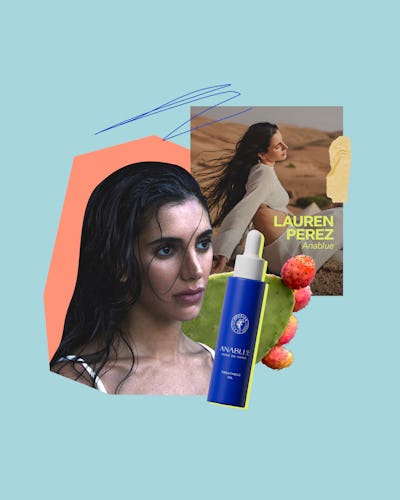Beauty Roots
Lauren Perez On Anablue, Moroccan Beauty, & Hair Oiling
“When people compliment my hair, it’s like they’re complimenting where I came from.”

In Beauty Roots, Bustle chats with diverse creators in the beauty industry about how their heritage has influenced their businesses and routines. Here, Anablue’s founder, Lauren Perez, talks about her Moroccan roots, earliest beauty memories, and entrepreneurial journey.
Lauren Perez grew up in Los Angeles surrounded by argan oil that was shipped in from family friends back in Morocco, where her dad was born. She remembers hearing her parents call the oil “liquid gold,” so it didn’t take long for her to catch on that it was something special.
As a French-Moroccan American, nourishing beauty ingredients like argan and prickly pear were a big part of her everyday life. “I would go into the bathroom and my mom would be in there dousing her body in different oils and natural products — God forbid we ran out,” she tells Bustle.
Perez shares that applying hair oil is a big part of Moroccan culture, and it’s one that always helps her feel connected to her roots. After years of learning from her mom, experimenting with her own unique oil combos, and sharing her concoctions with friends, Perez is ready to launch her own hair care line, Anablue — which is officially available today.
Below, the founder dives deeper into her family’s beauty traditions, her love of oils, and more.
Growing up with French-Moroccan parents, what types of beauty rituals were passed down to you?
When I was growing up, my mom never really bought American products. It was always stuff from Europe and Morocco, like the scrubs and the argan oils we had at home. On Saturdays, we would spend the day trying them all — it was like a spa day.
My parents constantly taught me about hair care, which led me to create my own low-maintenance routine where I didn’t do too much. The Moroccan approach is to take care of what you have in the most natural way possible. When you do, you know it’ll always look good.
When people compliment my hair, it’s like they’re complimenting where I came from; they’re enjoying my heritage, in a sense. That idea shows in Anablue today.
You visited Morocco a lot growing up. What types of beauty rituals did you see?
I’ve noticed that we make self-care into a routine in the States, but in Morocco, it's just embedded into everything people do and all the ingredients they use.
The women wake up and they do their routine, but it's not technically a “routine” to them — it's just using what they have. They're very lucky to have incredible oils and ingredients, but they're not thinking about it the way we do here.
How did you come up with the idea to create your own brand?
When I was younger, my friends would comment on how long my hair was and how fast it grew, and the only thing I could think about were the oils that I’d use at home with my mom. That was the only consistency in my self-care routine.
When I was around 14, I started to make my own oils. All of my friends wanted them, so I thought to myself, “This oil is benefiting everybody’s hair and they keep coming back for more, so I might have something here.”
What sets Anablue apart from other hair care brands?
There are three products — a scalp scrub, an oil, and a serum — that you can use together as a treatment or by themselves.
I also knew I wanted clean, organic ingredients from Morocco. One example is prickly pear, which helps bond the hair strands to prevent environmental damage. It will make your hair feel thicker and more luscious. It’s also protective, so it's definitely a unique ingredient.
We also use argan oil in all of our three products. Argan is super hydrating and nourishing. It helps the hair grow thicker, shinier, and healthier. Whenever my hair feels like it needs some sort of hydration, I just put some in and it’s instantly revived.
This interview has been edited and condensed for clarity.
This article was originally published on